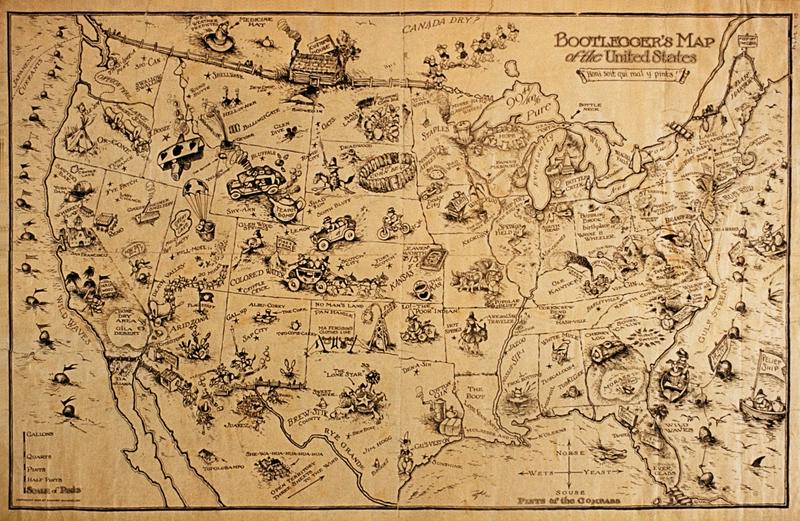American Prohibition And Bootlegging
By | December 4, 2018

The term “bootlegging” imparts images of rough and tumble men making moonshine up in the hills. That is certainly part of it, but there is much more to know. Bootlegging is defined as, “the illegal trafficking of alcohol.” The term, bootlegging, came into general use in the Midwest, during the 1880s, to describe the practice of concealing flasks filled with illicit liquor in boot tops when going to trade with Native Americans. The term became part of our American vocabulary when the United States Constitution enacted the 18th Amendment, which began Prohibition. Prohibition was in force from 1920 until its repeal in 1933.

After Prohibition was enacted, all existing alcohol was disposed of.
After the 18th Amendment to the United States Constitution was enacted, all the existing alcohol was required to be disposed of. Authorities went from establishment to establishment to oversee the process to ensure that it was all destroyed.

Manufacturing alcohol for personal use and bootlegging became popular during Prohibition.
The 18th Amendment eliminated the legal manufacturing and sale of alcohol. It didn’t, however, eliminate the demand for it. Where there is a will, there is a way and it wasn’t long before the average person began making their own alcohol. Stills to make moonshine and beer were carefully hidden in the woods where they would be out of sight. It was also being manufactured on a larger scale to supply illegal drinking establishments, called speakeasies.
Speakeasies have also been referred to as a blind pig and a blind tiger.
The name speakeasy is derived from the concept that a person should speak soft or easy about these illegal establishments as not to let the wrong person know about them. The saying, “mind your Ps and Qs is also said to have had a similar connotation, i.e., mind your PINTS and QUARTS. If a person drank too much, there was always a chance that the establishment would be discovered.

The fact is that the authorities did occasionally find these illegal drinking establishments and raid them from time to time. They would be shut down for a short time but back up and running eventually. Speakeasies were operated by organized crime players and were very profitable. These business owners were not going to lose out on their profit, so they always found a way to reopen.

Moonshiners initially used boats to smuggle liquor into the U.S. from other countries.
The earliest bootleggers began smuggling liquor into the U.S. from across the Canadian and Mexican borders and along the seacoasts. Their sources included countries such as The Bahamas, Cuba, and the islands of St. Pierre and Miquelon, near Newfoundland. A meeting place of the rum-running ships was a point off the coast of Atlantic City, New Jersey, just outside the 3-mile (5-km) limit where the U.S. government lacked jurisdiction. The bootleggers anchored in this area and discharged their cargo into high-powered boats that were built to outrace U.S. Coast Guard cutters.

The U.S. Coast Guard was charged with patrolling the water for smugglers transporting illegal liquor.
The U.S. Coast Guard got wise to the smugglers’ practices and began stopping and searching ships farther out from the coast and used their own fast boats. Bootleggers had other sources of alcohol, though. Some of these were bottles of “medicinal” whiskey that were sold in drugstores. Bootleggers took to bottling their own concoctions of spurious liquor and by the late 1920s, they were making liquor from corn, also known as moonshine, becoming major suppliers.

Bootlegging and Prohibition eventually led to the advent of NASCAR.
After the liquor made it to shore it was transported by car to its final destination. Moonshiners began “souping” up their cars to outrun the law. In their downtime, they began racing for sport to see who had the fastest car. This practice led to the organized sport of NASCAR.

The illegal practice of selling alcohol became a very attractive and profitable business for organized crime.
Bootlegging lead to the establishment of American organized crime, which still exists today. Al Capone was a notorious mob boss who gained recognition during Prohibition. Capone was also referred to as, "Scarface.” Organized gangs formed their own bands of men that would control an entire bootlegging operation. These gangs had territories in which they had sole control over the distribution of illegal alcohol. Eventually, gangs in different areas started working with each other, and soon bootlegging wasn’t their only crime. Other criminal activity included drug trafficking, gambling, prostitution, labor union racketeering, and loan-sharking, just to name a few.

The 18th Amendment was repealed and Prohibition ended on December 5, 1933.
December 5, 1933, is an important and historic date in American history. That was the day that the 21st Amendment to the United States Constitution was ratified. The ratification of the 21st Amendment is significant in that it repealed the 18th Amendment and ended Prohibition.
After the 18th Amendment was repealed, bootleggers still had a viable market. Alcohol was still illegal in some counties and municipalities and it continued to thrive as an illegal business. There are still moonshine stills in the backcountry of some states. It is a tradition and a way of life for some folks. Of course, there are still rules and regulations with regard to the manufacturing and sale of alcohol and not everyone likes the rules.

